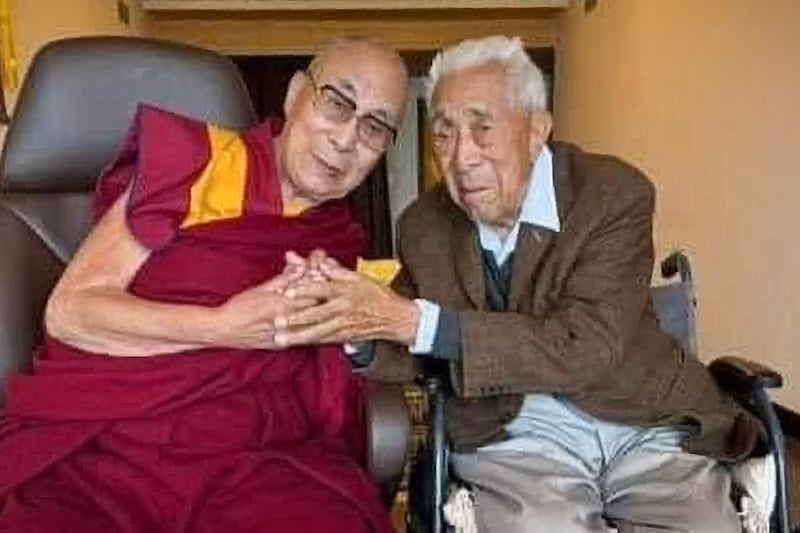Read RFA coverage of the story in Tibetan.
More than 1,200 Tibetans gathered on Tuesday to mourn the death of Dalai Lama’s elder brother, Gyalo Thondup, at a funeral service in the hill town of Kalimpong in northeast India.
Thondup, who played a prominent role in trying to preserve Tibetan culture and self-governance, died aged 97 on Feb. 8.
The funeral brought together family members and many prominent Tibetan and Indian leaders who paid their respects and honored his many contributions to the Tibetan cause.
“A towering figure in Tibet’s history, he lived a meaningful life defined by his unparalleled contributions to the Tibetan cause,” said Sikyong Penpa Tsering, head of the Central Tibetan Administration, or CTA, the Tibetan government-in-exile.
The Dalai Lama, 89, presided over a memorial prayer ceremony for his brother on Feb. 9 at Tashi Lhunpo Monastery in Bylakuppe, southern India, where he expressed his gratitude for Thondup’s life and work, and prayed for his “swift rebirth.”
“My brother worked with immense dedication and courage, and his determination was truly remarkable,” the Tibetan spiritual leader said. “Through these memorial offerings, we pray for his auspicious rebirth, specifically as a Tibetan, where he may continue to serve the cause of Tibet, as he so deeply desired. I, too, make this prayer on his behalf.”
Preserving Tibet’s identity
Throughout his long life, Thondup worked hard to save Tibet’s traditional culture and self-governance.

As a young man, he sought American support for an armed resistance against the Chinese Communist regime that had annexed Tibet in 1950. Later, he sought dialogue with Beijing and engagement with global leaders to draw attention to Tibet’s plight and advocate to protect its culture.
Thondup also sought to bring reforms to Tibetan social and political life, including land reforms which he implemented on his own estates.
Early Tuesday morning, Thondup’s body was carried from his residence in Kalimpong and cremated in a solemn ceremony that included his son, Ngawang Tanpa Thondup, and the Dalai Lama’s younger sister, Jetsun Pema.
Jetsun Pema, 85, expressed thanks to the Tibetan people for their outpouring of support and homage to her brother.
“My brother dedicated his life towards working hard for the Tibetan cause and for Tibet, and it is wonderful to see Tibetans from different backgrounds unite and come together to honor him,” Pema told RFA.
“If the Tibetan people can continue to honor my brother’s legacy by following his wishes and aspirations, that would be a good thing,” she added.
RELATED STORIES
EXCLUSIVE: In RFA interview, Gyalo Thondup recalled betrayals of fight for Tibet
Exclusive interview with Gyalo Thondup on the CIA and betrayals of the fight for Tibet (VIDEO)
Gyalo Thondup, Dalai Lama’s older brother, dies aged 97
Other prominent Tibetans in attendance included Kalon Gyalri Dolma, the CTA’s minister of security, and Lobsang Jinpa, secretary of the Office of His Holiness the Dalai Lama.
‘Without losing heart’
In his last media interview, Thondup told RFA in November 2024, “My hope is that Tibetans work together in unity and harmony, make Tibet’s culture and situation known to the world, and, without losing heart, continue to find ways to overcome difficulties. So, everyone, please work hard.”
Since Thondup’s passing, Tibetans around the world have held memorial services in his honor, including a prayer service organized by the CTA in Dharamsala on Monday.
On Tuesday, to coincide with the cremation in Kalimpong, the Tibetan Youth Congress led a prayer service at the Main Tibetan Temple in Dharamsala.
Tibetans inside Tibet have expressed their grief online, posting condolences, poems and other writings about Thondup on social media.
“You are a witness to our history,” one wrote. “May you be reborn in Tibet.”

Many netizens posted pictures of candlelight offerings and Potala Palace, the winter residence of the Dalai Lamas in Lhasa from 1649 to 1959, in remembrance of Thondup.
Ahead of the funeral service, Sikyong Penpa Tsering draped the Tibetan flag over the casket holding the remains of Thondup at his home in Kalimpong.
“During the most challenging periods in Tibet’s modern history, Thondup was the only person who could maintain relationships with major powers, including China,” Tsering told RFA.
“Tibetans can learn valuable lessons from the legacy of his lifelong struggle for Tibet,” he added.
Translated by Dorjee Damdul and Dhondup Gonsar. Additional reporting by Dickey Kundol, Tashi Wangchuk and Dorjee Dolma. Edited by Tenzin Pema for RFA Tibetan, and by Roseanne Gerin and Malcolm Foster.

